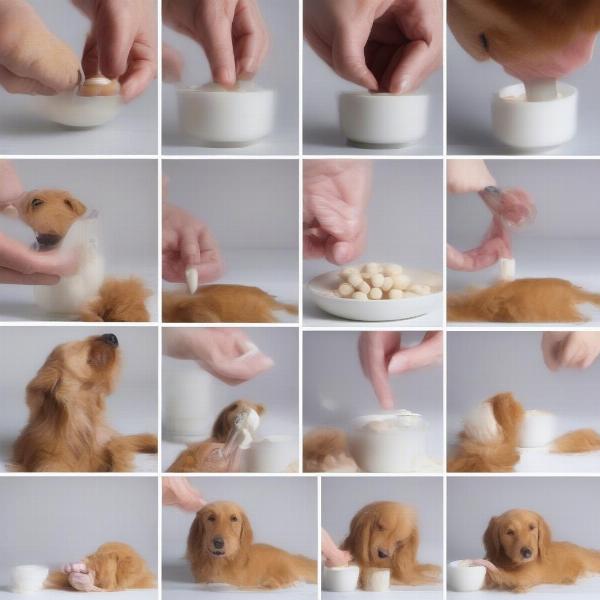Probiotic paste and cap for dogs are increasingly popular supplements aimed at improving gut health and overall well-being. But with so many options available, understanding the benefits, usage, and potential side effects is crucial for responsible pet ownership. This guide dives deep into the world of canine probiotics, providing you with the information you need to make informed decisions for your furry friend.
Understanding the Benefits of Probiotics for Dogs
Probiotics introduce beneficial bacteria into your dog’s digestive system. These good bacteria help maintain a healthy balance in the gut flora, which is essential for numerous bodily functions. A balanced gut flora can improve digestion, boost the immune system, reduce allergies, and even contribute to healthier skin and coat. They can also be helpful in managing digestive upset caused by antibiotics or dietary changes. Is your dog experiencing frequent diarrhea or gas? Probiotics might offer a solution.
When Should You Consider Probiotics?
Probiotics can be particularly beneficial during times of stress, such as during travel, boarding, or after a course of antibiotics. They can also help puppies establish a healthy gut flora early in life. If your dog suffers from chronic digestive issues, probiotics may provide long-term relief.
Choosing the Right Probiotic Paste or Cap
The market offers a wide array of probiotic pastes and caps, each with varying strains of bacteria and dosages. Choosing the right one for your dog depends on their individual needs and health status. Consult with your veterinarian to determine the best option for your dog. They can recommend specific strains and dosages based on your dog’s breed, age, and health history.
What to Look for in a Probiotic Supplement
When choosing a probiotic, look for products that contain multiple strains of beneficial bacteria, such as Lactobacillus and Bifidobacterium. Check the CFU (Colony Forming Units) count, which indicates the number of live bacteria per dose. Higher CFU counts generally suggest greater potency. Also, consider the storage requirements and expiration date to ensure the product remains effective.
Administering Probiotic Paste and Caps
 Administering Probiotics to a Dog
Administering Probiotics to a Dog
Probiotic paste is often palatable and can be added directly to your dog’s food. Capsules can be hidden in treats or administered with a pill popper. Always follow the manufacturer’s instructions for dosage and administration. Do you struggle to give your dog pills? Probiotic paste might be a more convenient option.
Potential Side Effects
While generally safe, probiotics can occasionally cause mild side effects like gas or loose stools, especially in the initial stages. If these symptoms persist or worsen, discontinue use and consult your veterinarian. Are you concerned about potential side effects? Start with a low dose and gradually increase it as your dog adjusts.
Probiotics and Your Dog’s Diet
A healthy diet plays a vital role in maintaining a balanced gut flora. is sauerkraut good for dogs Feeding your dog a balanced diet rich in fiber and nutrients can support the effectiveness of probiotic supplements. Consider incorporating foods like pumpkin, sweet potato, and leafy greens to promote digestive health.
Conclusion
Probiotic paste and cap for dogs can offer significant benefits for digestive health and overall well-being. By understanding the different types of probiotics, choosing the right product, and administering it correctly, you can help your dog maintain a healthy and happy gut. Always consult with your veterinarian before starting your dog on any new supplement, especially if they have pre-existing health conditions. A balanced gut is a key to a happy and healthy dog!
FAQ
- How long does it take to see results from probiotics? It typically takes a few weeks to see noticeable improvements in your dog’s digestion.
- Can I give my dog human probiotics? No, it’s best to use probiotics specifically formulated for dogs.
- Are probiotics safe for puppies? Yes, probiotics can be beneficial for puppies, but consult your vet for appropriate dosage.
- Can probiotics be given with other medications? Generally, yes, but it’s always best to check with your vet.
- What are the signs of an unhealthy gut in dogs? Signs can include chronic diarrhea, vomiting, gas, and changes in appetite.
- How should I store probiotic paste and caps? Follow the manufacturer’s instructions, as storage requirements can vary.
- What if my dog doesn’t like the taste of probiotic paste? Try mixing it with a small amount of their favorite food.
Related Articles:
About ILM Dog:
ILM Dog is your trusted international resource for all things dog-related. We provide expert advice on dog breeds, health, training, nutrition, grooming, and much more. Whether you’re a seasoned dog owner or just starting your journey, we’re here to support you every step of the way. Our dedicated team of canine experts offers comprehensive guidance across various areas, including breed selection, health and wellness, behavior and training, nutrition, and grooming. For any questions or inquiries, please contact us via email at [email protected] or by phone at +44 20-3965-8624.